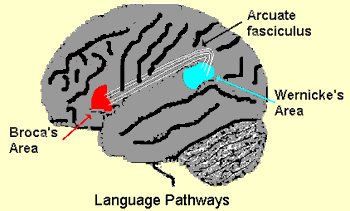Neuroscience For Kids
Bilingualism May Delay Alzheimer's Onset
By Max Sobrero, Neuroscience for Kids Guest Writer
July 18, 2011
 Could speaking two languages delay the onset of Alzheimer's
disease? Dr. Ellen Bialystok, a neuroscientist at York University, has
collected data that suggests it could. She has shown that people with
Alzheimer's disease (AD) who speak two languages (bilingual) are often
diagnosed with AD at a later age than people with AD who speak one
language (monolingual).
Could speaking two languages delay the onset of Alzheimer's
disease? Dr. Ellen Bialystok, a neuroscientist at York University, has
collected data that suggests it could. She has shown that people with
Alzheimer's disease (AD) who speak two languages (bilingual) are often
diagnosed with AD at a later age than people with AD who speak one
language (monolingual).
Dr. Bialystok studied 211 people who were diagnosed with AD. Of these 211 people, 102 were considered to be bilingual because they spent most of their life using at least two languages. After assessing the probable age at which the patients began showing signs of cognitive impairment (a hallmark of AD), the researchers collected information about the patients' educational background, language and occupational history to determine if these factors affected the onset of cognitive decline.
Bialystok's results are intriguing: in comparison to monolingual patients, bilingual patients experienced AD symptoms an average of 5.1 years later. Furthermore, many were diagnosed with the disease 4.3 years later than monolinguals.
 Could this be due to differences in education?
That is, if people are more educated, would their AD symptoms begin later
in life? Dr. Bialystok suggests this is unlikely because monolinguals in
this study had, on average, two more years of education than bilinguals.
Gender differences also did not account for this remarkable effect.
Could this be due to differences in education?
That is, if people are more educated, would their AD symptoms begin later
in life? Dr. Bialystok suggests this is unlikely because monolinguals in
this study had, on average, two more years of education than bilinguals.
Gender differences also did not account for this remarkable effect.
Dr. Bialystok explains that bilingualism may provide a neuroprotective effect; in other words, speaking two languages exercises the brain. Data from the Einstein Aging Study published by researchers at Albert Einstein College of Medicine supported the claim that leisure activities such as reading and board games lowered the risk of dementia (Verghese et al., 2003). Thus, it is possible that bilingualism - a skill that requires the active involvement of several major brain areas - could protect the brain against the onset of dementia.
While it is currently unknown if bilingualism prevents AD, there is growing evidence that it may delay its onset. Future research assessing the prevalence of AD in highly bilingual countries has yet to be conducted, but such work could yield more definitive data on the neuroprotective benefits of bilingualism.
References and more information:
- NY Times interview with Dr. Bialystok
- Craik, F.I.M., Bialystok, E. and Freedman, M., Delaying the onset of Alzheimer disease, Neurology, 75:1726 -1729.
- Verghese, J., Lipton, R., Katz, M., Hall, C., Derby, C. and Kuslansky G., Leisure activities and the risk of dementia in the elderly, New England Journal of Medicine, 348:2508-2524, 2003
- Alzheimer's disease - Neuroscience for Kids
- Language and the Brain - Neuroscience for Kids
- Second Language Learning - Neuroscience for Kids
Copyright © 1996-2011, Eric H. Chudler, University of Washington
